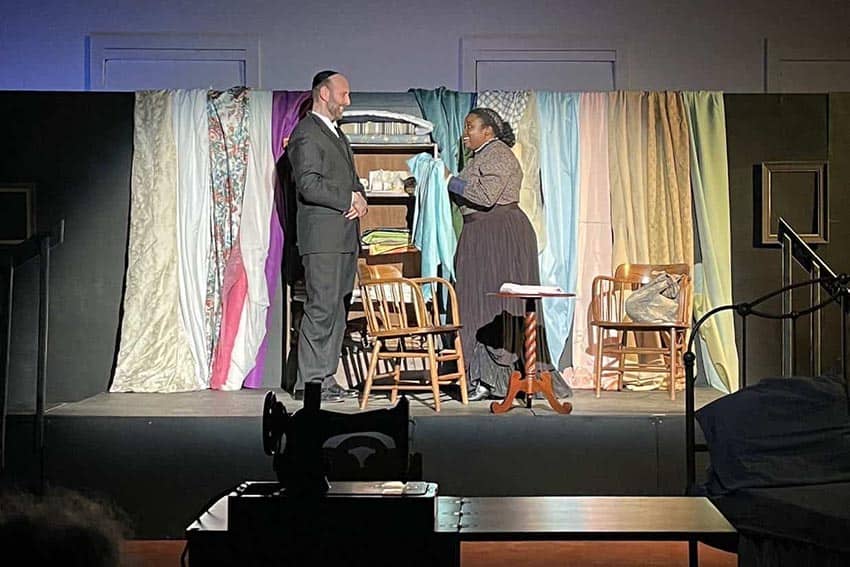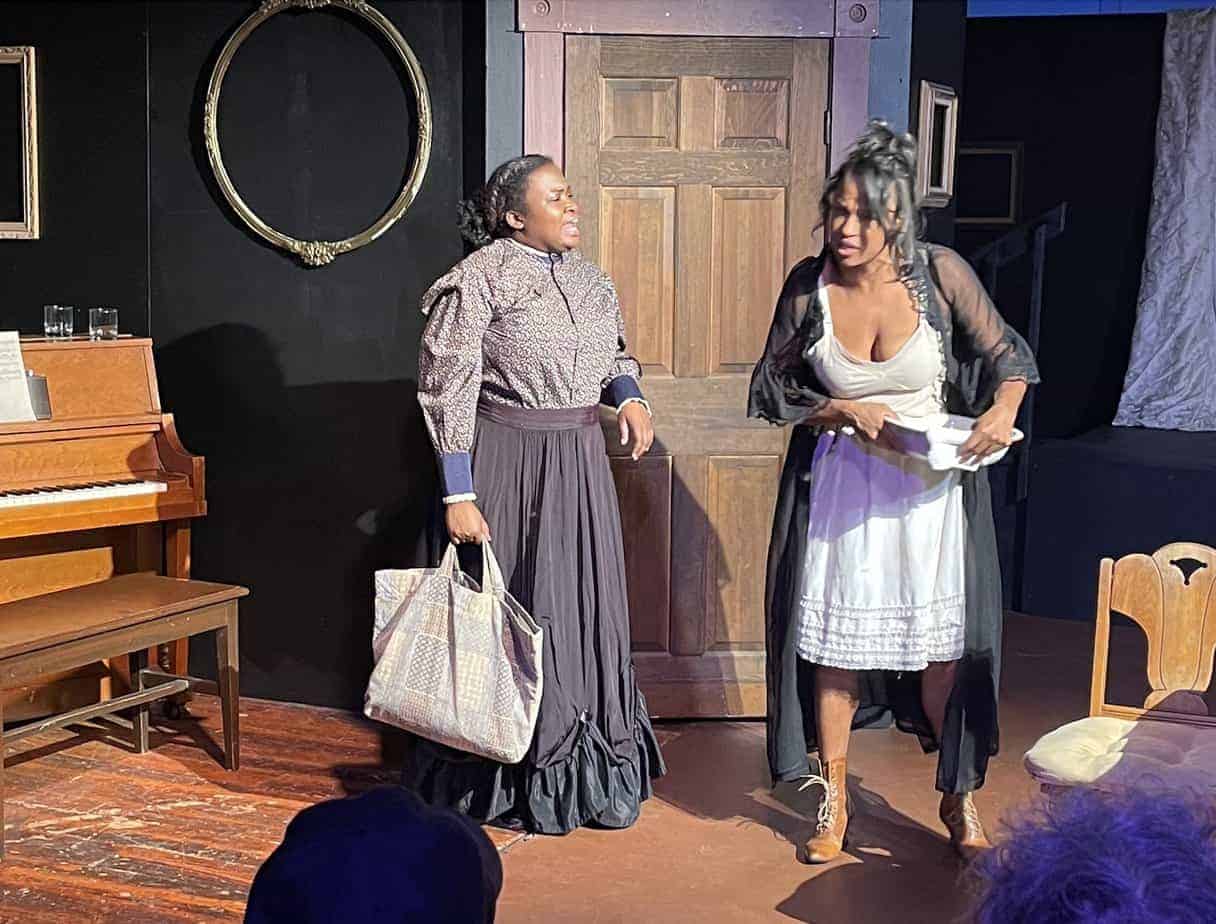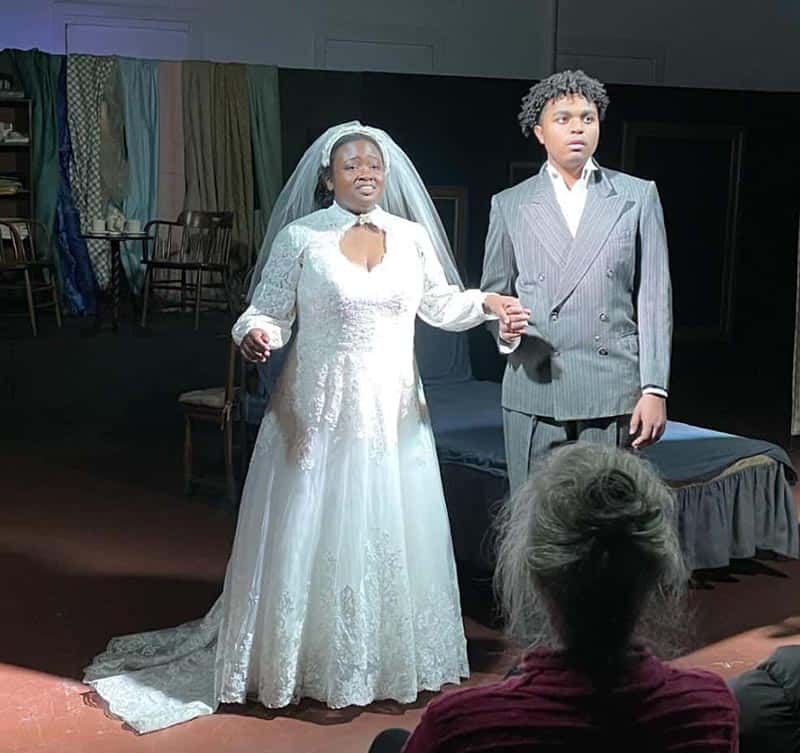Intimate Apparel: Poignant, Sad and True

Intimate Apparel Shows That Things Don’t Always Work Out

It’s 1905 in New York City. We meet the protagonist sitting at her sewing machine. Esther Mills (Tahmie Der) has lived a tough life, beginning in South Carolina where her grandparents were slaves and the family struggled to make it by working on a farm.
Esther has the pulled-back hair, the matronly long skirt, and the sensible shoes of a working woman, in contrast to Mrs. Van Buren (Linda Tardif) who we see prancing about in her extensive undergarments bemoaning her opium-puffing, unfaithful husband.
Despite the fact that Esther dreams of someday being married, there aren’t a lot of role models or good examples to give her hope. And soon, a letter (remember those?) comes in the mail that will change Esther’s world.
In the center of the stage is a bed and in the back, a fabric store run by an immigrant named Mr. Marks from Romania, (Gabriel Levey). Marks is the character who treats Esther the best, as an equal, and as a good customer and she rewards him by buying yards and yards of the fine fabrics he shows her.
Mrs. Dickson, (Alika Hope) runs this boarding house where seven young women reside, all working hard to pay their rent and keep up. She is tough on Esther and isn’t very kind when it comes to her chances of ever moving up in the world. We root for Esther but sometimes you gotta be careful what you wish for.

The bed at the center of the stage acts as a scene setter because this bed will be used by many different people each with a different quilt. Time and again we watch the actors change that comforter from bright red to a multicolored bawdy pattern, then to a fine white quilt that was hand sewn by Esther.
And inside that last quilt is where Esther stashes away her money, with a dream of opening a beauty salon where hardworking black women like her can be pampered and feel almost as good as the privileged white women for whom Esther sews intimate apparel.
It’s a tough time for African Americans and anyone living in the tough conditions of the Lower East Side, and racism is as common as the clear class divisions, that pit the characters against each other.
The character of Esther is revealed to be the true hero of the play, we watch her with sympathy, and then with hope as the letters grow more frequent, and when we see her in a wedding dress, we hope for the best. But let’s get real. It’s 1905, and this cad from Barbados, George Armstrong, isn’t up to the task. He is barely changed out of his wedding suit then he’s asking for money and heading down to the saloon.
The audience had developed some sympathy for this noble hard working man, as he read the letters about his struggles digging the canal in the malaria-infested jungles of Panama. And we sympathize with George again when he recounts the bitterness of not being able to find a job in the big city, despite his construction skills and work ethic. We want to root for him and the young actor Colby Chandler does a fine job of making us feel that way, for a while anyway.
George has regaled her with letters written by a smarter man than him, and she’s replied with letters written by her pal Mayme (Kyle Boatwright). Neither of them knew what they were getting but Esther becomes the better of the two when George Armstrong muddies the waters with the same friend who helped her write her letters.
Lynn Nottage, the playwright, has won two Pulitzer prizes for drama, and a MacArthur genius fellowship. She is unique because no other woman has done this, and in this play, she is really hitting on all cylinders, truly in her wheelhouse, the black experience in America. Her script is concise and there are no redundant or wasteful scenes. Director Jasmine Brooks brought together a talented group of actors who were able to wring real passion from the script and the dialogue was spot on, and true to the world in 1905 that was such a totally different time and the class divisions were brutal.
The accents of the actors were spot on, and young Colby did well with his Caribbean lilt, as did Gabriel Levey as Mr. Marks. Kyle Boatwright (Mayme) had a lot of credits in the show, writing two of the songs, producing, helping with scenic design and getting off some funny lines, in her portrayal of a woman of the night.
This show is memorable and poignant, and worth seeing for sure.
Intimate Apparel, by Lynn Nottage. Directed by Jasmine Brooks, produced by Silverthorne Theater. Performances at the Perch at Hawks and Reed, Greenfield MA: March 16, 17, and 18 at 7:30 pm; March 12, 18 at 3 pm. Tickets
